Maccabi Haifa F.C.
Maccabi Haifa Football Club (Hebrew: מועדון הכדורגל מכבי חיפה, Moadon HaKaduregel Maccabi Haifa) is an Israeli professional football club, based in City of Haifa, a section of Maccabi Haifa sports club. The club plays in the Israeli Premier League. Maccabi Haifa home games are played at Sammy Ofer Stadium. The stadium, which is shared with rivals Hapoel Haifa, is the second largest in Israel football, with a capacity of 30,780.[2]
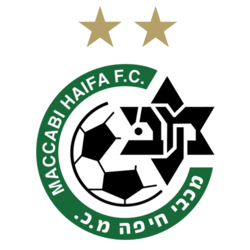 | ||||
| Full name | Maccabi Haifa Football Club | |||
|---|---|---|---|---|
| Nickname(s) | The Greens, The Green Locomotive, The Green Apes | |||
| Short name | Maccabi Haifa | |||
| Founded | 1913[1] | |||
| Ground | Sammy Ofer Stadium, Haifa | |||
| Capacity | 30,780 | |||
| Owner | Ya'akov Shahar | |||
| Chairman | Asaf Ben Dov | |||
| Manager | Barak Bakhar | |||
| League | Israeli Premier League | |||
| 2019–20 | Israeli Premier League, 2nd | |||
| Website | Club website | |||
|
| ||||
| Active departments of Maccabi Haifa | ||||||||||||||||||||||||
|---|---|---|---|---|---|---|---|---|---|---|---|---|---|---|---|---|---|---|---|---|---|---|---|---|
|
Maccabi Haifa is one of four clubs in the "Big Four" in Israeli football. It has won twelve League titles, Six State Cups and four Toto Cups. Maccabi has won the championship and the cup in the same season (referred to as winning the "double") one time, and was the First Israeli club to qualify for the group stage of the UEFA Champions League.
History
Early years
Maccabi Haifa Football Club was established in 1913 in the port city of Haifa in the Mutasarrifate of Jerusalem (present-day Israel). As the local football association wasn't founded in Mandatory Palestine until July 1928, there were no officially organized competitions during the season, and the club played only friendly matches.
After a period of inactivity, the club was re-organized in February 1923.[3] The club playing a handful of matches during the season, including taking part in a cup competition which was called "The Hebrew Cup". Due to its distance, the club was given a bye to the final,[4] which it lost to Maccabi Nes Tziona 0–2.[5][6][7]
The club was overshadowed by its city rival Hapoel Haifa, but even in its first years adopted a very adventurous and offensive style of play based on technique and short passes.
In 1942, the club reached the Israel State Cup final, but was defeated 12–1 by Beitar Tel Aviv in the final.
Maccabi Haifa remained a small, struggling club that spent most of its time shifting between Liga Leumit and the lower leagues.
In 1962, the team defeated Maccabi Tel Aviv 5–2 in the State Cup final, and won the first title of the club. In 1963 it reached the final again, but lost to Hapoel Haifa 1–0 in the first Haifa derby in State Cup final.
The 80s
In the 1980s Maccabi Haifa finally entered the 'Israeli' champions' club, clinching the title thrice (in 1983–84, 1984–85 and 1988–89 seasons).
In the 1983–84 season Maccabi Haifa won its first ever championship, under coach Shlomo Sharf and general manager Yochanan Vollach, overcoming Beitar Jerusalem and Hapoel Tel Aviv. The Yerukim (Greens) were known for their "all-around-offense" and flashy technique football style, often resulting in bad defensive formation and resultant losses.
Sharf's team played with 4 strikers, including: Moshe Selecter, Zahi Armeli and Ronny Rosenthal who were positioned at point and midfield and managed to build their defense around the legendary goalkeeper Avi Ran.
A year later, Maccabi Haifa won a second championship in a decisive performance. In 1986 Maccabi lost the championship in a controversial final match against runners-up Hapoel Tel Aviv. The single goal scored in that match by Gili Landau was said to be scored from a passive offside position, which by the rules of the time should have resulted in a disqualification of the goal and a scoreless draw, guaranteeing MHFC the title. Due to poor TV coverage, the issue has never been resolved.
In 1988, Maccabi Haifa decimated Maccabi Tel Aviv 10–0 to earn its biggest win ever. That game, one of the more famous in Israeli's football lore, wasn't even televised. Furthermore, it probably was the beginning of the intense rivalry between the two clubs. In 1989, under the capable hands of Amazzia Levkovic, the club won another championship.
The 90s
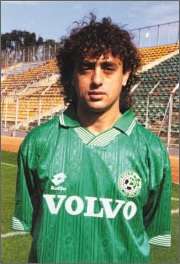
In 1990 Maccabi Haifa established itself as a dominant club in Israel. It began by winning the Double – League championship and the national cup in the 1990/1 season and continued with the introduction of three talented young players: Eyal Berkovic, Reuven Atar and Tal Banin.
In 1992 Maccabi Haifa was purchased by Ya'akov Shahar, who became the owner and president of the club. Under Shahar's management, Maccabi Haifa enjoyed financial stability and professional working regulations on a par with European football clubs' standards. Maccabi Haifa's highlight season was 1993–94. After winning the 1993 cup, Maccabi Haifa gave a stunning performance in the UEFA Cup Winners' Cup (CWC), beating Torpedo Moscow 3–1 and Parma 1–0 in the last 16, only to lose on penalties. During the season in the domestic league (then called Liga Leumit), the team went unbeaten for the entire season, out of an overall unbeaten streak of 48 games, thus winning a spectacular championship, and breaking many Israeli records. The Maccabi Haifa 1993–94 squad including Eyal Berkovic, Reuven Atar, Alon Mizrahi and Serhiy Kandaurov, and is considered one of the best squads in Israeli football history.
In 1996 Eyal Berkovic and Haim Revivo, the latter had joined the team the previous season, both left Haifa for European clubs. While the two gained great personal success there, Maccabi Haifa went into a slump. The team's standards of maintaining the services of the manager for multiple seasons was thrown as the team went through several managers during 4 years. As result, the team failed to win the national championship title, despite securing the National cup in 1998.
In 1999, under the guidance of the Czech manager Dušan Uhrin, Maccabi Haifa beat French giants Paris Saint-Germain and Austrian club SV Ried to reach the quarter-final of the Cup Winners' Cup. In the middle of the season, Haifa's excellent striker Alon Mizrahi left for French club Nice resulting in a defeat in the CWC quarter-final and a slump in the club's league performance. The club's winning record continued to falter until the arrival of Avram Grant.
2000 and Beyond
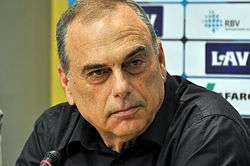
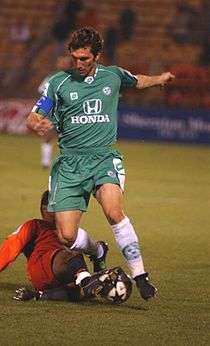
Former Maccabi Tel Aviv Manager Avram Grant was appointed in 2000 as manager of Maccabi Haifa. Under Grant's guidance, the team regained its dominating offensive style. Grant, along with a much improved squad, led the club with an almost unstoppable team, winning the championship. At the center of attention were a series of virtuoso performances by Yossi Benayoun, including what some consider to be several of the finest goals in Israeli league history. A spontaneous burst of celebrating fans onto the pitch caused a tragic disaster. A young fan, Amir Rand, was crushed against the guarding rails and left comatose.
A year later, Grant won a second championship, relying on a veteran Israeli defense: Alon Harazi, Arik Benado and Adoram Keise, and on a trio of foreign footballers: Giovanni Rosso (Croatia), Raimondas Žutautas (Lithuania) and the young Nigerian striker Yakubu. Following the second championship, Avraham Grant left Haifa for the Israeli national team and was replaced by then Israel U-21 manager Itzhak Shum.
In 2002, Haifa made Israeli club history by becoming the first Israeli team to qualify for the group phase of the UEFA Champions League. In the group phase, the team defeated Olympiacos and Manchester United. Haifa managed 7 points overall scoring 12 goals, and finished in the third place, securing a place in the UEFA Cup.
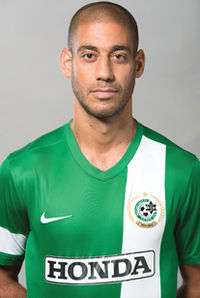
In the 2003–04 season Maccabi Haifa, led by ex-Maccabi footballer Ronny Levy won the championship mainly due to the poor showing of the other league teams. Maccabi Haifa youth club (ages 16–18) won the domestic championship, and an Israel national kids team of Maccabi Haifa players won Fox Kids World Cup for 12-year-olds.
History was made during the 2005–06 season. After months of indecision regarding the contract of Ronny Levy, it was renewed and Levy guided the club to eleven straight victories in the first eleven games of the Israeli Premier League season. This was also the key to Maccabi Haifa taking the league title after building a strong lead. While the club enjoyed great domestic success, it was not as fortunate in European play. Though Haifa was a seeded team for the UEFA Champions League second qualifying round, it drew the strong Swedish club, Malmö FF. Haifa lost 3–2 in Sweden, and drew 2–2 at home.
In the 2006–07 season, the club played against Liverpool. In the first game of the third round of the qualifying matches held in England, Haifa's Gustavo Boccoli scored on the 29th minute an advantage that lasted just four minutes. Craig Bellamy evened the score and in front of 40,000 local fans, Haifa stood bravely up to the 88th minute when Mark Gonzales scored the winning goal for the hosts. Due to the security situation in Israel, the return match was not held in Ramat Gan but in Kiev, Ukraine, at the Valery Lobanovsky stadium, with 1,700 spectators. The game ended in a 1–1 tie. The last twenty minutes of the game were stressful for Rafa Benitez's players. Indeed, the giant Peter Crouch gave his team the advantage (54) and an away goal, but Roberto Colautti (63) tied the score and from here on the movement towards the host's goalpost became one-sided. The tie score sent Haifa to compete in the UEFA Cup.
In the return match in Bulgaria, Haifa played well: Xavier Dirceu scored an impressive goal from a distance, Alain Masudi and Roberto Colautti left Eljendario Sanderinio one honor goal. In the Groups stage, Haifa faced strong opponents: The Scottish Rangers, the Serbian Partizan Belgrade, the French Auxerre and the Italian Serie A team Livorno. In the 88th minute, the Scots succeeded in doubling the score from another penalty kick given away by a Haifa defender. This time Charlie Adam scored and sealed the victory. Haifa returned home and hosted Partizan Belgrade. An early goal by Anderson Xavier, the Brazilian midfielder, put Haifa in an excellent place with six points. Haifa needed one point in the away game in Italy against Livorno to complete the task successfully. At this stage Haifa was drawn against CSKA Moscow. The game was moved to the Spartak stadium in Vladikavkaz due to extreme weather in Moscow. 30,000 Russian fans crowded the stadium. Torpedo beat Haifa 1–0 and Lokomotiv beat it 3–0. Again Haifa did not score an away goal, but the result (0–0) signaled that Haifa might use its home advantage in the return match.
In the 2007–08 season, Maccabi Haifa finished 5th place in the League and was eliminated in the last-16 phase of the State Cup. Ronny Levy announced that he was leaving. Haifa won the Toto Cup after a 2–0 victory over Bnei-Sakhnin.
Haifa opened the 2008–09 season with hopes of remaining a top team. At the end of the season, coach Elisha Levy won his first personal title and Haifa made Israeli soccer history, winning six championships in one decade.
.jpg)
Maccabi Haifa returned to the Champions League for the 2009–10 season. A 3–0 win over FC Red Bull Salzburg insured its second win in the span of seven years, with goals by Dvalishvili, Golasa and Ghadir. Haifa entered the 2009–10 Champions League group stage in Group A, competing against Bayern Munich, Juventus and Bordeaux. Haifa finished the competition with a record of 6 losses, conceding 8 goals and without scoring. The club subsequently lost the championship title to Hapoel Tel Aviv on the last day of the season.
In the 2010–11 Israeli Premier League season, Maccabi Haifa has won the Israeli Championship title but lost the chance to achieve the Double by losing to rivals Hapoel Tel-Aviv in the State Cup final.
The 2011–12 season was a disappointing one. After winning the League title in the previous season, the team started the season with qualification matches in the UEFA Champions League, but eliminated after a penalty defeat to the Belgian Genk. At the local Israeli Premier league it was another disappointment. Maccabi Haifa struggled for the European football spot but a draw in the last round wasn't enough and Maccabi finished in a disappointing 5th place. Another failure was at the State Cup as the team lost in the Final to rivals Hapoel Tel Aviv from a controversial 93rd-minute goal. The disappoint season caused the owner Ya'akov Shahar to appoint former player and club icon Reuven Atar as the manager for the next season instead of Elisha Levi who left the club after clinching 3 championship titles in 5 years with the club.
With Reuven Atar on the lines Haifa opened the season with one win 4 draws and 4 losses and was next to last and so did the worst opening season in her history. After the ninth round Atar was Fired and replaced by Arik Benado, the youth team coach and team captain in the past. Under Benado Haifa return to the top of the table and showed good performances during the season. Haifa gave fight to Maccabi Tel Aviv but finished only second.
On 25 July 2013 Maccabi Haifa defeated Xazar Lankaran 8–0 in qualifying round of UEFA Europa League. thus set a new record of the highest win of an Israeli team in European competition.
On 24 May 2016 Maccabi Haifa winne Maccabi Tel Aviv 1–0 on the Israel State Cup Final after eighteen years and return play on European competition after three years.
Sponsorship and fan base
| Period | Kit Manufacturer | Shirt Sponsor |
|---|---|---|
| 1980–82 | Adidas | Alfa Romeo |
| 1982–84 | Umbro | Drucker |
| 1984–92 | Adidas | Volvo |
| 1992–93 | Lotto | |
| 1993–96 | Isracard | |
| 1996–98 | Nike | Volvo |
| 1998–02 | Lotto | |
| 2002–04 | Honda | |
| 2004–07 | Puma | |
| 2007–11 | Lotto | |
| 2011–18 | Nike | |
| 2018–present | Volvo |
The club is sponsored by Ya'akov Shahar, chairman of Mayer's Cars and Trucks Ltd., the official importer to Israel of Volvo and Honda. The fan base is mainly in Haifa and northern Israel, although the club is one of the most popular in Israel. Average attendance in the home matches is approximately 24,000 fans. According to a survey which had been conducted in 2010, Maccabi Haifa has the biggest number of fans of all the teams in Israel, approximately 25.8% of Israeli football fans. 2
On 30 June 2011, a Haaretz poll identified Maccabi Haifa as the most popular football team among Arab citizens of Israel.[8]
Another survey had been conducted in March 2012 by Yedioth confirmed that Maccabi Haifa is the most popular team among Israeli football fans (28%), female football fans (33%) and Arab citizens of Israel. Same survey revealed that 75% of Haifa residents support the team.[9]
Historically, the block group encourages fans were home games Kiryat Eliezer Stadium stands 11–12 called also Yetzia Gimel (יציע ג') – C Block – which has become synonymous with the hardcore and dedicated fans.
In 2002, The fans established an organization named Green Apes, which supports both soccer and basketball. Members usually sit in the bleachers section 11.
In addition, Maccabi Haifa has an official fan club which was founded in the first decade of the 21st century, and has about 20,000 members. The club is also supported overseas. The club are also support overseas, kept contact with them by buying items gift shop club through his website.
At the 2008–09 Championship season the Maccabi Haifa audiences won the title of Fair Audience of the Year.
In 2010, another organization of fans was established for Maccabi Haifa, and named Inferno Verde, whose members sit in the stands section 5a. The organization's goal is not to outdo the Green Apes, but rather to join forces for victories and championships of the team.
Maccabi Haifa supporters have friendly relations with supporters of other clubs: Green Apes are in good relations with AZ Alkmaar's Alkmaar Fanatics and Ultra Boys Haifa are in good relations with Werder Bremen's Ultra Boys
Number of surveys made during the first decade of the 21st century found that Maccabi Haifa is Israel's most favorite team.
At the beginning of the 21st century the club website was upgraded, at Walla!. The edits were made by the historian of the club, Isaac Haverman, and include breaking news, articles, information about the club, officials, staff, players and former players, information on past games, galleries, statistics, multi–seasonal Guinness Book of club and depth articles, some of which also include a unique research statistic, work of Haverman. The site also includes an online forum, online store and club fans.
Starting in 2011 Haifa operates an official Facebook page, which includes information, news, pictures, online ticketing- online and update time – real game results. The Facebook page has 83,000 registered fans. In February 2011, the club opened an official YouTube page, which puts up interviews of players and the coach before and after games. The club has uploaded about 373 movies and has approximately 3200 subscribers, and approximately 550,000 video views (as of May 2014).
City rivalry with Hapoel Haifa
For more information see: Haifa derby
The rivalry with Maccabi Tel Aviv
The strong rivalry between the two Israeli soccer clubs (something called “the Israeli Classico” and “the derby of israel”) on the hegemony of Maccabi Israel as well as Israeli soccer in general and the title of the best soccer club in Israel. Maccabi Haifa aspires to oust Maccabi Tel Aviv from this position, which is the club with the largest number of titles in Israel, and to become the leading club in Israel by winning many titles and qualifying for the European Cup stages (Cup Winners' Cup, UEFA Cup) (Haifa and Tel Aviv) competed against each other for the championship title, and Haifa beat Maccabi Tel Aviv in a number of games, including a 10–0 win in 1988 (a game in which revenge for the loss was 2–10 in 1949). Losing 0–7 in 1952), and winning 5–0 in the 1993/1994 season in which Haifa won the championship without loss but was eliminated from the State Cup factory three days Following Maccabi Tel Aviv's 1–1 win at Kiryat Eliezer, a repeat of the Maccabi Cup in the first decade of the 21st century alongside Maccabi Tel Aviv's weakness (except for the 2002/2003 season) ) Cooled the rivalry between them, but rivalry with Hapoel Tel Aviv, which competed with the top of the table during this period, strengthened.
Historical Kits
|
1983–84 Liga Leumit winners
|
1984–85 Liga Leumit winners
|
1988–89 Liga Leumit winners
|
1990–91 Liga Leumit and Israel State Cup winners
|
1992–93 Israel State Cup Winners
|
1993–94 Liga Leumit Winners
|
1994–95 Israel State Cup Winners
|
|
1997–98 Israel State Cup winners
|
2000–2001, 2001–2002 Israeli Premier League winners and 2002–2003 Champions League – Group Stage
|
2003–04 Israeli Premier League winners
|
2004–05 and 2005–06 Israeli Premier League winners
|
2008–09 Israeli Premier League winners
|
2010–11 Israeli Premier League winners
|
2015–16 Israel State Cup Winners
|
Club crest
The origin of the club crest is the World Zionist sports organization "Maccabi". The icon is actually fine M.c.b.i. Within the Star of David symbolizes Judaism. In most years the symbol of the group was supposed to symbolize "Maccabi" with the words "Haifa" beneath green on white or white on green. With the success of the club at the end of the 1980s added an illustration of a lion next to a symbol, but this figure has been removed. At the beginning of the 1990s, with Europe joining the club different games icon, and added a picture of football left with the words "Maccabi Haifa BC" Maccabi Haifa and Hebrew F.C. English. At the end of 2005/2006 season, when the team won its 10th championship, added a gold star above the symbol. At the end of the 2009 season winning its 11th championship, the group played its inaugural game with the traditional symbol of the club as it was the early '80s. At the end of the 2013 season, in 100 of the club, added bay leaves around the icon used as a sign of victory and glory dating back to Greek mythology. In addition, also added a gold plaque indicating the year of the establishment of the club and the current year (100th club). After the 2019/20 season, the Israeli Proffesional Football Leagues administration decided that each championship star on the member clubs' crests should represent 5 championships, while Maccabi's crest star represented 10 championships. Following this decision, the crest was updated with another championship star.
Grounds
Kiryat Eliezer Stadium
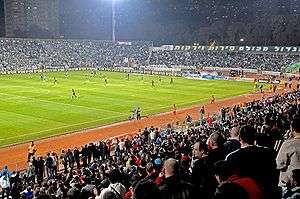
Maccabi originally played in Kiryat Haim, which is the main training grounds of Hapoel. In 1955, a gift from the Italian Labour Union was a football pitch in the heart of the city of Haifa, which would become the new home of Maccabi. The opening match was a Haifa derby, won by Maccabi 4–1 over Hapoel.
Kiryat Eliezer missed out on staging a historic event when Maccabi reached the group stage of the UEFA Champions League. It was the first time an Israeli club had made it that far in the competition, though the lucrative gate receipts expected to have been made by hosting matches in Israel were lost when UEFA forced Maccabi to look for an alternative in Europe but outside of Israel because of security concerns. The choice was to host the matches at Neo GSP Stadium in Nicosia, Cyprus. After Israel had increased the security and proved stability, MHFC was allowed to play their European matches in the State of Israel. Because Kiryat Eliezer was not up to par with UEFA's demands, the team played their European home matches in Central Israel at Bloomfield Stadium (14,413 capacity), as well as Ramat Gan National Stadium (41,583 capacity) due to the high demand of Maccabi Haifa fans wanting to attend the matches. Finally, Maccabi Haifa was allowed to host European matches at Kiryat Eliezer Stadium. In 2013, Maccabi Haifa played in the Europa League against PAOK (Greece), AZ Alkmaar (Netherlands), and Shakhter Karagandy (Kazakhstan).
On 14 May 2014, the last match was played in the stadium, in which Maccabi Haifa hosted Maccabi Tel Aviv in the Israeli Premier League.
Sammy Ofer Stadium
Due to the recent success of the club in European competitions, the municipality of Haifa offered the club land by the beach for a brand new stadium at the southern entrance to the city. In the fall of 2008, the final plans were approved. Sammy Ofer Stadium was completed in November 2013. Constructions costs are estimated $135,000,000.00 with a seating capacity of 30,870. The stadium is named after naval-mogul Sammy Ofer, who donated $20,000,000 to build the stadium and the rights to name it after himself. The Sammy Ofer Stadium is developed and built by the Haifa Economic corporation managed by Adv. Gal Peleg. It is the home ground of Maccabi Haifa, Hapoel Haifa. It also hosts international matches of Israel national football team along Teddy Stadium.
Honours
Domestic competitions
League
- Israeli Championships:
- Second Division
Cups
European competitions
- UEFA Champions League
- Group stage (2): 2002–03, 2009–10
- UEFA Europa League
- Group stage (2): 2011–12, 2013–14
- UEFA Cup
- Round of 16 (1): 2006–07
- UEFA Cup Winners Cup
- Quarter Finalists (1): 1998–99
- Round of 16 (1): 1993–94
Youth
- UEFA Youth League
- Play-offs: 2016–17
- Sukkot Cup
- Winners (1): 1958
- Lilian Cup
- Winners (1): 1984
- Milk Cup
- Winners (1): 2004
- Insel Cup
- Winners (1): 2016
Records and statistics
- Record home win: 10–0 v Maccabi Tel Aviv (1988)
- Record League Defeat: 0–9 v Hapoel Petah Tikva (1953)
- Record Cup Defeat: 1–12 v Beitar Tel Aviv, Israel State Cup, Final (1942)
- Record home Attendance: 39,120 v

- Most League Appearances: 419 Alon Harazi
- Most appearances in one season: 66 Adoram Keise
- Most League Goals: 90 Zahi Armeli
- Most League Goals in a Season: 28 Alon Mizrahi (Liga Leumit, 1993–94) and Shlomi Arbeitman (2009–10)
- Most Goals scored in a Match: 6 Aharon Gershgoren v Ironi Kiryat Shmona (1965)
- Most League Goals in a Season: 97 (1993–94)
- Most points in a season: 95 – 39 games (1993–94)
- Most league assists in a season: 16 Eyal Berkovic (1993–94) and Yossi Benayoun (1999–00)
- Most Games without a loss: 46 (throughout 3 seasons) (1993, 1993–94, 1994)
- Most Games in a row scoring at least one goal: 39 (1993–94)
- Most Away Games without losing: 30 (1993–94)
- Lowest conceded goals per game: 16 goals in 35 games (average: 0.46), Ligat Ha'Al (2009–10)
Competition
Including UEFA Intertoto Cup
| Competition | P | W | D | L | GF | GA | GD |
|---|---|---|---|---|---|---|---|
| UEFA Champions League (8 seasons) | 38 | 15 | 6 | 17 | 70 | 54 | +16 |
| UEFA Cup Winners' Cup (3 seasons) | 18 | 9 | 2 | 7 | 29 | 22 | +7 |
| UEFA Europa League / UEFA Cup (9 seasons) | 47 | 18 | 12 | 16 | 61 | 59 | +2 |
| UEFA Intertoto Cup (3 seasons) | 8 | 3 | 0 | 5 | 6 | 13 | −7 |
| Total | 111 | 45 | 21 | 45 | 166 | 148 | +18 |
Players
Current squad
- As to August 6, 2020[11]
|
|
Out on loan
|
Other players under contract
|
|
Foreigners 2019–20
Only up to six non-Israeli nationals can be in an Israeli club squad (only five can play at the same time). Those with Jewish ancestry (e.g., Josh Cohen), married to an Israeli (e.g., Nikita Rukavytsya) or have played in Israel for an extended period of time, can claim a passport or permanent residency which would allow them to play with Israeli status.
Captains
Neta Lavi, has been the captain since 2019.
| Years | Captain |
|---|---|
| 1963–77 | |
| 1978–79 | |
| 1979 | |
| 1979–82 | |
| 1982–83 | |
| 1983–85 | |
| 1985–86 | |
| 1991–94 | |
| 1994–96 | |
| 1996–97 | |
| 1997–98 | |
| 1998–00 | |
| 2000–06 | |
| 2006–14 | |
| 2014–16 | |
| 2016–18 | |
| 2018–19 | |
| 2019– |
Personnel
Current coaching staff
| Position | Staff |
|---|---|
| Head coach | |
| Assistant Coach | |
| Assistant Coach | |
| Club Administrator | |
| Fitness Coach | |
| Fitness Coach | |
| Goalkeeping Coach | |
| Analyst | |
| Club doctor | |
| Physiotherapist | |
| Logistic | |
| Logistic | |
| Scout | |
| Development Manager Mental |
Last updated: 10 July 2019
Source: F.C. Maccabi Haifa Official Website
Youth department
2019–20 squad
Note: Flags indicate national team as defined under FIFA eligibility rules. Players may hold more than one non-FIFA nationality.
|
|
Current coaching staff
| Position | Staff |
|---|---|
| Manager | |
| Assistant manager | |
| Club Administrator | |
| Sport Director Youth Academy | |
| Club doctor | |
| Physicaltherapy | |
| Physicaltherapy | |
| Logistics |
Source: 24 June 2018 F.C. Maccabi Haifa Official Website
Notable players and Managers in club history
Former players
For details on former players, see List of Maccabi Haifa F.C. players and Category:Maccabi Haifa F.C. players.
Most appearances
| Rank | Name | Period | Games | Goals |
|---|---|---|---|---|
| 1 | 1990–97 1998-09 | 495 | 29 | |
| 2 | 1998–2014 | 440 | 79 | |
| 3 | 1990–94 1996–2006 2010–11 | 399 | 9 | |
| 4 | 1977–93 | 396 | 9 | |
| 5 | 1994–2013 | 386 | 0 | |
| 6 | 1978–89 1990–94 | 368 | 7 | |
| 7 | 1962–76 | 360 | 11 | |
| 8 | 1964–78 | 334 | 27 | |
| 9 | 1974–85 | 303 | 45 | |
| - | 1974–85 1988–89 | 303 | ||
Managerial history
See also: List of Maccabi Haifa F.C. managers
|
|
|
See also
References
- History of Maccabi Haifa F.C.
- "Facts and Numbers". Sammy Ofer Stadium Haifa (in Hebrew). Retrieved 13 November 2018.
- Haifa Doar HaYom, 8 February 1923, Historical Jewish Press (in Hebrew)
- Maccabi Haifa First Final Loss 24 May 2016, Kaduregel Vintage (in Hebrew)
- The Football "Hebrew Cup" Doar HaYom, 11 May 1923, Historical Jewish Press (in Hebrew)
- The Hebrew E.I. Cup in Football Doar HaYom 3 May 1923, Historical Jewish Press (in Hebrew)
- The Football During the British Mandate Era Archived 20 May 2014 at the Wayback Machine Asher Goldberg, 28 September 2010, IFA (in Hebrew)
- http://www.haaretz.com/print-edition/sports/soccer-mad-pro-hatikva-1.370388
- Kuper, Uri. "The real national team?" (in Hebrew). one.co.il. Archived from the original on 24 March 2012.
- Maccabi (Michael) in the South and Maccabi Haifa in the North, First Place in Liga Bet HaBoker, 24 June 1945, via archive.football.org.il (in Hebrew)
- "First Team".
External links
| Wikimedia Commons has media related to Maccabi Haifa F.C.. |